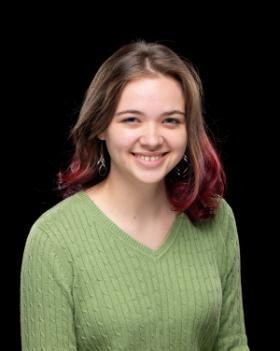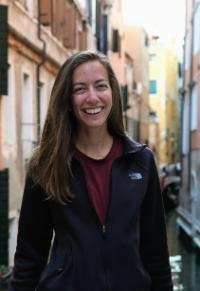Math Symposium
Symposia are typically held at 6:00 on the first Thursday evening of each month during the regular semester.
Symposia during the 2025-26 academic year will occur on Sep 4, Oct 2, Nov 1, Feb 5, Mar 5, and Apr 2.
Undergraduate Research in Mathematical Sciences Mini-Conference
December 9, 2025 AL 302
The 5th Semi-annual URMS Mini-Conference will include an invited speaker talk at 3:00 followed by three talks about current research by some of BJU's senior math majors at 3:30, 4:00, and 4:30.
3:00 Session
Think of Your Future
Speaker: George Sturm, PhD
Synopsis: Someone once said, "If you are not serving God in your profession, it's time to pick another profession." For those who are training to be an evangelist or preacher, their future path of serving the Lord should be clear. But what about those who are studying for a profession in the mathematical sciences? “Should I be looking for another profession, or can I really use my mathematical talents to serve the Lord?”
This talk will describe ways that disciples can use their mathematical talents to serve the Lord. Real-life examples will be given from the fields of mathematics, statistics, computer science, education, medical sciences, agriculture, AI, media broadcasting, journalism and electrical engineering.
3:30 p.m. | Dec. 9, 2025 | Alumni Bldg 302
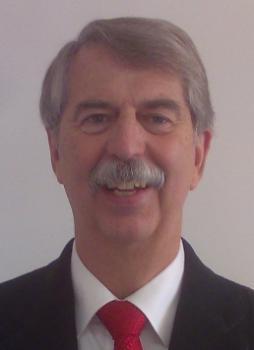
Speaker Bio: Dr. George Sturm received his Ph.D. in Statistics from The Ohio State University and began his professional career with AT&T’s Engineering Research Center in Princeton, New Jersey (USA) where he successfully worked with a team of engineers and computer scientists to help improve the productivity and quality of AT&T’s manufacturing process. He later moved into academics at Grand Valley State University (Michigan) where he carried on an extensive statistical consulting program with other university departments. In 1993, he and his family were called to the mission field in the former communist country of Albania where he was a professor at the Alexander Xhuvani University.
In recent years Dr. Sturm led the effort to establish Nehemiah Gateway University, a private academic institution of higher learning in Albania, and became their first Rector. He also is the owner of the largest privately owned regional radio station (Radio Logos) that covers a large portion of Albania. AI is extensively used at Radio Logos in the production of programs and the quality monitoring of the transmissions. During the years 2013-2020 Dr. Sturm was involved in missionary work in the country of North Korea (The Democratic People’s Republic of Korea, DPRK) where he served as the Dean of Electrical and Computer Engineering at the Pyongyang University of Science and Technology (PUST).
3:30 Session
How Does Einstein Tile the Plane? The Geometry of Aperiodic Monotiles
Speaker: Lance Johnson
Synopsis: An einstein (German for “one stone”) is a single shape that can be used to tile the plane without repeating patterns. The existence of an einstein was an open problem until 2023, when the “hat” and “turtle” einsteins were discovered. This talk will cover basic concepts of tiling theory needed to understand these tiles before discussing how to prove their aperiodicity.
3:30 p.m. | Dec. 9, 2025 | Alumni Bldg 302
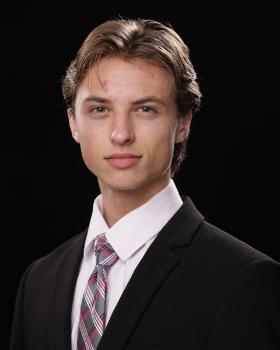
Speaker Bio:
Lance Johnson is a senior mathematics major at Bob Jones University. Having grown up as a military kid, he lived across the United States, Spain, and Japan, and has developed a passion for new experiences and for finding beauty in the world around him. He plans to graduate in December of 2026.
4:00 Session
Time Tetris: How Optimization Shapes a Class Schedule
Speaker: Mia Kane
Synopsis: In a university context, difficulty frequently arises with scheduling course offerings that minimize conflicts. Restrictions such as student course requirements and classroom capacity must be considered. The formulation of an optimization model to solve a simplified version of these difficulties will be presented. Also discussed are the model’s implementation in R and the results produced, as well as various solution techniques that may be used in future work.
4:00 p.m. | Dec. 9, 2025 | Alumni Bldg 302

Speaker Bio: Mia Kane grew up on the mission field in Ratanakiri, Cambodia and discovered a love for math during her junior year of high school. She began a Bachelor of Science degree in Mathematics at Bob Jones University in 2022 and plans to graduate in May of 2026. Her favorite field of mathematics is optimization, especially linear programming. Aside from math, Mia’s hobbies include crocheting, reading, and writing.
4:30 Session
Mathematical Food for Thought: Pretzel Knot P(1,1,n) and Its HOMFLY Polynomial
Speaker: Eric Probus
Synopsis: From the beginning, knot invariants have played an important role in the development of knot theory with knot polynomials being at the forefront over the last several decades. The HOMFLY polynomial, a powerful generalization of the Alexander and Jones polynomials, has seen considerable use. This talk gives a brief history and explanation of the HOMFLY polynomial before giving a formula for the HOMFLY polynomial of pretzel knot P(1,1,n).
4:30 p.m. | Dec. 9, 2025 | Alumni Bldg 302
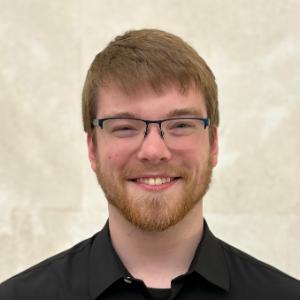
Speaker Bio: Eric Probus is a proud Kansas City, Missouri native, currently finishing a Bachelor of Science degree in Mathematics as well as a Bachelor of Science degree in Music and Church Ministries at Bob Jones University. He plans to graduate in December 2025 and hopes to further pursue mathematics in grad school the following year in the fall of 2026. Eric is a passionate communicator whether that is conveying the beauty of mathematical ideas or deep human emotions through music. In his spare time, he enjoys cheering on the Chiefs, playing board games, and listening to his fiancée play the harp.
~~~ ~~~~~ Future Symposia ~~~~~ ~~~
~ Past Symposia ~
Colloquium, November 6, 2025
Invited Speaker: Erick Ross
Cramér α-random primes and the Fundamental Theorem of Arithmetic
Abstract: Define the set of Cramér α-random primes, where N is chosen to be a Cramér α-random prime with probability 1/(log^αN). At α = 1, this is the classical set of Cramér random primes, which model the actual primes. Now, the Fundamental Theorem of Arithmetic states that every natural number can be written uniquely as a product of primes (allowing multiplicity). In this talk, we investigate how close the Cramér α-random primes come to satisfying this property. Along the way, we also prove an analog of the Hardy-Ramanujan inequality for the classical Cramér random primes.
6:00-7:30 p.m. | Nov. 6, 2025 | Alumni Bldg 216
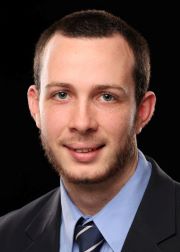
October 2, 2025
Success in Challenging Fields:
Engaging at BJU and Beyond
This event will include a panel discussion about engaging with mathematics-related challenges and how to balance math/work/life for success at BJU and beyond these walls.
Panelists:
- Katelyn Baxa, alumnus -- mathematics education
- Caleb Erkins, current student -- actuarial sciences, senior
- Josh Hammer, current student -- computer science, senior
- Isabelle (Overton) House, alumnus -- cybersecurity
- David Pittman, alumnus -- mathematics
6:00-7:30 p.m. | Thursday, October 2, 2025 | Alumni Building 210
Undergraduate Research in Mathematical Sciences Mini-Conference
April 29, 2025 AL 302
3:30 Session
HOMFLY Polynomials and Their Use as a Knot Invariant
Speaker: Eric Probus
Synopsis: Knot invariants are properties of a knot that stay the same regardless of the representation of the knot which proves very useful in distinguishing more complicated knots. HOMFLY polynomials are a powerful knot invariant that generalizes other known knot polynomials. This talk will focus on the history of knot polynomials and the theory behind HOMFLY polynomials.
3:30 p.m. | Apr. 29, 2025 | Alumni Bldg 302

Speaker Bio: Eric Probus is a proud Kansas City, Missouri native currently working on a Bachelor of Science degree with a double major in Mathematics and Music & Church Ministries at Bob Jones University. He plans to graduate in December 2025 and pursue mathematics in grad school the following fall. Eric is a passionate communicator whether that is conveying the beauty of mathematical ideas or deep human emotions through music. In his spare time, he enjoys cheering on the Chiefs, playing board games, and listening to harp music.
4:00 Session
Scheduling in Academic Settings
Speaker: Mia Kane
Synopsis: In a university context, difficulty frequently arises with scheduling course offerings that minimize conflicts. Restrictions such as student class requirements and classroom capacity must be considered. The constraint formulations and decision variables chosen in select current research will be discussed, as well as the application of the relevant components to the scheduling process of Bob Jones University.
4:00 p.m. | Apr. 29, 2025 | Alumni Bldg 302
Speaker Bio: Mia Kane grew up on the mission field in Ratanakiri, Cambodia and discovered a love for math during her junior year of high school. She began a bachelor of science degree in Mathematics at Bob Jones University in 2022 and plans to graduate in May of 2026. Her favorite field of mathematics is optimization, especially linear programming. Aside from math, Mia’s hobbies include crochet, reading, and writing.
4:30 Session
General Topic: Space-filling Curves
Speaker: Tripp Lawrence
4:30 p.m. | Apr. 29, 2025 | Alumni Bldg 302
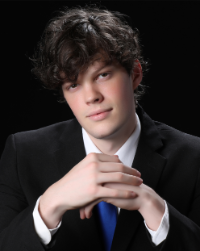
Speaker Bio: Tripp Lawrence is a student at Bob Jones University double-majoring in Mathematics and in Biochemistry and Molecular Biology. He has a deep love for both pure and applied mathematics as well as the many fields of STEM, which is a large reason he has pursued such a wide range of STEM disciplines in his undergraduate work. He grew up in Greenville, SC and plans to graduate in May of 2026. After graduation, he plans to pursue a graduate degree in mathematics hopefully with an emphasis on how it can be applied to pharmaceutical research.
5:30 Session
Graphical Representation of Knots
Speaker: William Min
Synopsis: Mathematical knots are closed loops in 3D space that cannot be untangled without cutting. Among the countless knots and representations of the same knots, some knots have symmetric forms, such as torus knots. My research focuses on constructing symmetric knots via piecewise parametric representations and 3D transformations in the Cartesian space, beginning with the trefoil (𝑇₂,₃) as the simplest case.
5:30 p.m. | Apr. 29, 2025 | Alumni Bldg 302
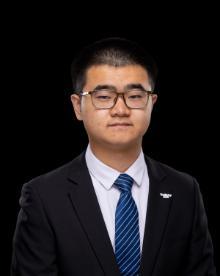
Speaker Bio: William Min is a senior mathematics major at BJU, set to graduate in May 2025. Born and raised in Shanghai, China, he is passionate about both the rigor and beauty of mathematics. In his free time, he enjoys philosophical discussions and hosting board game nights. William is currently applying to graduate programs in mathematics, aiming to further his research and teaching pursuits.
6:30 Session
An Upper Bound of the Stick Index of Cubic Lattice Pretzel Links
Speaker: Trey Miller
Synopsis: The stick index of a cubic lattice link is the minimum number
of sticks needed to construct the link in a cubic lattice. We
create a process for constructing any cubic pretzel link and a method for counting the sticks used in the construction, thus giving an upper bound of the stick index.
6:30 p.m. | Apr. 29, 2025 | Alumni Bldg 302
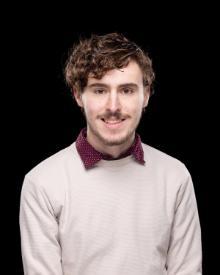
Speaker Bio: Trey Miller grew up in Wisconsin, first in Amberg, then in Watertown. He has since moved to Greer, SC where he is pursuing a B.S. in mathematics at Bob Jones University. He plans to graduate in May of 2025. After he graduates, he plans to take a gap year before applying to graduate school.
April 3, 2025 ~ "My Favorite Theorem"
Mathematical Gems from Four Invited Speakers
6:00-7:30pm, AL 210
The Proof is in the Pi
Invited Speaker: Kaitlyn Baxa, B.Ed. Math
Speaker Bio: Kaitlynn Baxa is a PLTW Teacher at JL Mann High School in Greenville, teaching engineering and computer science. She loves this special opportunity to show her students the application of math in the careers they are pursuing. Outside of the classroom, she is the assistant coach for the VEX robotics teams at her school. Recently, she has learned Python and enjoys experimenting with new ideas to expand her programming knowledge.
On Euler's Answer to the Basel Function
Invited Speaker: Erick Ross, B.S. Math and Computer Science
Speaker Bio: Erick Ross is currently finishing work toward his Master of Science degree in Mathematical Sciences at Clemson University.
Bertrand's Postulate: A Proof by Erdos
Invited Speaker: Jim Knisely, Ph.D. Mathematical Sciences
Speaker Bio: Jim Knisely has taught mathematics and computer science at BJU since 1992. His research for his doctorate was in communication in networks, while his master’s research was in solving systems of equations using pipelined multi-processor computers. He enjoys studying finite graph properties especially graph colorings. A more humorous interest is in optimal lawn mowing techniques. He finds his field experiments especially invigorating. Jim also consults in the computing field each summer. These jobs have allowed him to contribute in diverse areas like EDI in the textile industry, signature capturing on pen pads, and rapid prototyping with 3D printers.
Finding Patterns
Invited Speaker: Dave Brown, Ph.D. Mathematical Sciences
Speaker Bio: Dave Brown is a Professor of Mathematics and also serves as department chair of Mathematics at BJU. His area of interest lies primarily in abstract algebra. His favorite courses to teach are Abstract Algebra, Linear Algebra, and Number Theory.
March 6, 2025
Speed Quizzing (Math Edition)
Tonight is a chance to try your skills at computation and your memory of mathematical facts and trivia. Bring a team (or join a team) of three and compete in a speed challenge.
These are the same questions as used in the Guthrie Mathematics Tournament held in February.
6:00-7:30 p.m. | Thursday, March 6, 2025 | Alumni Building 210
February 6, 2025
Success in a Challenging Field:
Engaging in Math at BJU and Beyond
This event will include a panel discussion about engaging with math and other fun challenges at BJU and how to balance math/work/life for successful engagement with the world beyond these walls.
Panelists include:
- Owen Coss, alumnus -- mathematics
- Auria Morrow, alumna -- mathematics
- David Pittman, alumnus -- mathematics
- Erick Ross, alumnus -- mathematics and computer science
- Alex Smith, alumnus -- actuarial science
- Caleb Whisnant, alumnus -- actuarial science
6:00-7:30 p.m. | Thursday, February 6, 2025 | Alumni Building 210
Undergraduate Research in Mathematical Sciences Mini-Conference
December 10, 2024 AL 302
4:00-4:50 Session
Report on the Albertson Conjecture
Speaker: Maggie Willette
Synopsis: The Albertson Conjecture is a mathematical hypothesis that attempts to find a lower bound for the crossing number of a graph. These have been historically difficult to calculate, so Albertson, along with many other mathematicians, attempt to find a relationship between the crossing number and another area of graph theory, which in this particular case, is the chromatic number of that graph.
4:00-4:50 p.m. | Dec. 10, 2024 | Alumni Bldg 302

Speaker bio: Maggie Willette, born in Metro Detroit, began studying mathematics at Bob Jones in 2021. She is currently pursuing a bachelor's degree in mathematics, planning to graduate in December. Her two favorite aspects of math are graph theory and statistical analysis. Aside from her studies, she enjoys playing soccer with friends and her sisters and practicing her violin and euphonium.
5:30-6:20 Session
Branching from Decision Trees to Random Forests
Speaker: David Stodola
Synopsis: Random Forest is an ensemble machine learning algorithm that builds multiple decision trees and combines their predictions to improve accuracy and prevent overfitting. It operates by constructing many trees using random subsets of the data and random subsets of features at each split. For classification tasks, it uses majority voting to make predictions, while for regression, it takes the average of individual tree predictions.
5:30-6:20 p.m. | Dec. 10, 2024 | Alumni Bldg 302
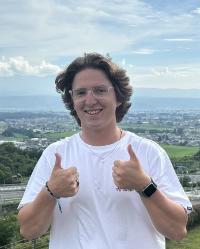
Speaker Bio: David Stodola, a native of the New England woods, graduated from Trinity Christian High School in 2020 with a strong passion for applied mathematics and modern physics. He is currently a senior pursuing a Bachelor of Science degree in Mathematics at BJU. David's aspirations include becoming a data analyst. Beyond his academic pursuits, David enjoys a range of hobbies including dirt biking, powerlifting, and playing pickleball.
6:30-7:20 Session
Predicting with Confidence: Non-parametric Bootstrapping
Speaker: Aria Milam
Synopsis: Sometimes in statistical analysis we run into the problem of not having a large enough sample size. This can make inference difficult. Bootstrapping provides a solution to this problem and allows us to create confidence intervals that would otherwise be impossible. This method utilizes a technique of creating a sampling distribution parameter estimates by resampling the known sample hundreds or thousands of times. Although counterintuitive, bootstrapping is a robust method with many applications.
6:30-7:20 p.m. | Dec. 10, 2024 | Alumni Bldg 302
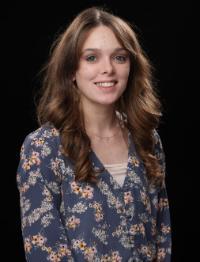
Speaker Bio: Aria Milam is from Houghton Lake, Michigan. She is a senior mathematics major at BJU and is graduating in December. She enjoys data analysis and is passionate about using it to develop solutions to real-world problems. She is looking forward to pursuing a career as a data analyst.
November 7, 2024 --
Tripp Lawrence
Title: Quantifying Rubisco Polymerization within Carboxysomes
Synopsis: Rubisco has been found to spontaneously polymerize into higher-ordered structures such as chains and lattices within alpha-carboxysomes. This research explores the interactions and polymerization of proteins through liquid-liquid phase separation. This type of biological and biophysical process is a quickly growing field of study which has deep implications in how biological structures can spontaneously form. Whereas previously, best analytical methods involved visually qualifying which rubiscos participate in these polymers, the purpose of this study was to consistently quantify any participating rubisco molecule. This talk will address the use of mathematical techniques from probability/statistics, three-dimensional lattice theory, graph theory, graphical analysis, and computer techniques from data structures and program optimization to quantify the biophysical phenomena of protein interaction and polymerization.
6:00-7:30 p.m. | Nov. 7, 2024 | Alumni Bldg 210
Invited Speaker

Speaker Bio: Tripp Lawrence is a BJU student double-majoring in biochemistry/molecular biology and mathematics. He has a deep love for both pure and applied mathematics as well as the many fields of STEM, which is a large reason he has pursued such a wide range of STEM disciplines in both his degrees. He plans to go to graduate school and pursue a degree in pharmaceutical data science, with a focus in medical bioengineering. He believes that the various fields of STEM can be used to make life better for everyone, and wants to further our understanding of biology, biochemistry, and medicine through mathematics. He pursued an internship at Purdue University this past summer in Structural Biology and Biophysics, and his findings using mathematics, computer science, and biophysics will be the subject of his talk.
September 5, 2024 --
Not-Knots Puzzling Challenge
The first symposium of the 2024-2025 academic year (held September 5) was a math logic challenge. Nine teams of students attempted to solve six problems in a dynamic setting in order to earn pieces of a tile-puzzle. The goal was to solve the tile-puzzle before time ran out. The problems included coded messages, logical teasers, a board game (maybe?), and a clues-hunt through the building. Several teams successfully completed the challenge with the first and second place teams finishing at nearly the same time.
Special thanks to faculty member Donna Lawrence for preparing this event.
2024-25 MSS Kickoff
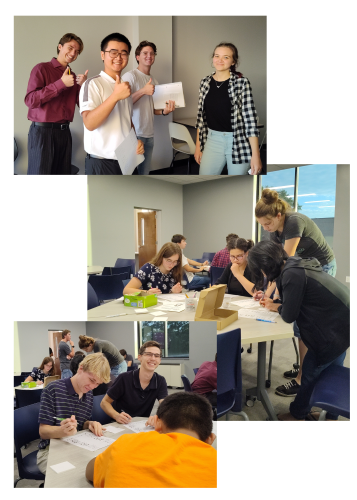
Undergraduate Research in Mathematical Sciences Mini-Conference
December 5, 2023 AL 302
3:30pm - Dabin Song
Title: Apollonian Gaskets
Abstract: Apollonius of Perga (circa 240 BC – 190 BC) For any three circles in a plane that are pairwise tangent to each other, two new circles can be constructed that are each tangent to all three original circles. These configurations were introduced by Apollonius of Perga (circa 240 BC – 190 BC) and are known as Apollonian Gaskets. Using an iterative process to construct new generations of circles tangent to the existing circles generates interesting fractals; this process is known as an Apollonian Circle Packing. Ideas used to study Apollonian gaskets and circle packings touch on both geometry and number theory and are very attractive topics in modern mathematics. This talk will survey some interesting ideas and discuss some historic as well as recent developments on the topic.
3:30pm, Dec. 5, 2023 | AL 302
Speaker Bio: Dabin Song is from South Korea and is a senior majoring in mathematics at Bob Jones University.
4:15pm - David Stodola
Title: Who are You Most Like? Data Analysis by Machine Learning
Abstract: In data analysis, it is often desirable to find subgroups of individuals who share similar characteristics and to gain insight by observing the different behaviors of those subgroups. Machine learning algorithms provide a controlled and efficient way to classify individuals into subgroups by similar characteristics. Two of these techniques, k-clustering and regression trees will be discussed. Detection of atypical subpopulations and visualization of clusters/groupings will be demonstrated.
4:15pm, Dec. 5, 2023 | AL 302
Speaker Bio: David Stodola, a native of the New England woods, graduated from Trinity Christian High School in 2020 with a strong passion for applied mathematics and modern physics. He is currently a senior pursuing a Bachelor of Science degree in Mathematics at BJU. David's aspirations extend to graduate school, where he plans to specialize in data analysis—a field he believes holds the key to unlocking valuable insights in various industries. Beyond his academic pursuits, David enjoys a range of hobbies including dirt biking, fishing, and playing pickleball.
5:30pm - Ethan House
Title: A Computational Approach to the Reconstruction of Bidegreed Graphs on Twelve Vertices
Abstract: One of the largest open problems in graph theory, the Reconstruction Conjecture, asks whether a graph is uniquely identifiable by the collection of subgraphs derived from a that graph through the deletion of elements in a specified way. Due to the complexity of the conjecture, portions of the problem have been proven using exhaustive search algorithms. This talk showcases one such algorithm tests the conjecture for a specific class of bidegreed graphs. Both benefits and shortcomings of the approach will be discussed.
5:30pm, Dec. 5, 2023 | AL 302
Speaker Bio: Ethan House is currently finishing a Bachelor of Science degree in Mathematics at Bob Jones University and is looking forward to beginning graduate work next fall.
6:30pm - Peyton McGinnis
Title: How to Build a Computer That Generates No Heat: A Visual Survey of Reversible Computing
Abstract: Reversible computing is a paradigm of computing wherein every output of a computational process can be used to deterministically obtain the process’s inputs. Although the idea is simple, reversible computing has the fascinating consequence that a reversible computation loses no information, and therefore generates no physical heat. This is known as Landauer’s principle, and its initial discovery in 1960 led to an abundance of research in the field of reversible processes since it implied that a completely reversible computer could revolutionize energy efficiency in computing. Over the past few decades, computer scientists have made significant progress developing a cohesive theory of axiomatic reversible logic, reversible circuitry, reversible computation, and reversible programming. This talk presents a survey of the motivation, processes, and logic of reversible computing using visual examples.
6:30pm, Dec. 5, 2023 | Alumni Bldg 302
Speaker Bio: Peyton McGinnis was born in Charleston, SC and began attending BJU in 2020. He is working towards completing a B.S. in computer science with a focus in mathematics. Throughout his time at BJU, he has been involved in many on-campus organizations and completed a semester internship at SermonAudio. He is passionate about research, user interface design, and abstract mathematics.
November 2, 2023 --
Owen Coss, Ph.D.
Title: Synchronization of Coupled Oscillators
Abstract: Systems of coupled oscillators are prevalent throughout nature and engineering, and understanding their equilibria is important for understanding the synchronization behavior these systems exhibit. One of the most popular models of such systems is the Kuramoto model. This talk will focus on the Kuramoto model with "rank one" coupling between the oscillators. Exploiting the structure of the equations for this case yields a new formulation of the model that is easier to solve. Furthermore, the properties of this new formulation allow for an efficient algorithm to find all of the equilibria in much less time than general solving methods.
6:00-7:30 p.m. | Nov. 2, 2023 | Alumni Bldg 210
Invited Speaker
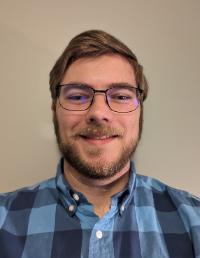
Speaker Bio: Owen Coss was born in Greenville and attended Bob Jones since elementary school. He earned his B.S. in Mathematics with a minor in Computer Science in 2015. Afterwards, he attended North Carolina State University where he earned a Ph.D. in Algebraic Geometry in 2020. Even though his primary study was math, he had several programming related summer internships along the way. Owen works as a member of the Continuous Product Engineering team at NetApp, Inc.
October 5, 2023 --
Auria Morrow
Title: What Can Tech Software Do for You?
Description: In this interactive session, we will examine the variety of mathematical and data management software available for commercial use today. These are the programs used by technical roles in every industry, and understanding their use will give you a leg up on the competition in the job market.
6:00-7:30 p.m. | Oct. 5, 2023 | Alumni Bldg 210
Invited Speaker
Speaker Bio: Auria Garland Morrow graduated with a Mathematics degree from BJU in 2016. She subsequently earned her Master’s Degree in Applied Statistics from USC while working as an analyst at Truist Bank. She is currently a Business Information Engineer at Truist and lives in Greenville with her husband Corey. She is passionate about distilling math and big data into insights for a non-technical audience.
September 7, 2023 -- Panel Discussion
Successfully Engaging in Math at BJU and Beyond
This event will include a panel discussion about engaging with math and other fun challenges at BJU and how to balance math/work/life for successful engagement with the world beyond these walls.
Panelists:
- Ethan House, current student -- senior mathematics
- Peyton McGuinnis, current student -- senior computer science
- David Pittman, alumnus -- mathematics
- Erick Ross, alumnus -- mathematics and computer science
- Caleb Whisnant, alumnus -- actuarial science
6:00-7:30 p.m. | Thursday, September 7, 2023 | Alumni Building 210
May 3, 2023 -- Mathematical Sciences Symposium
URMS Talk: On Reconstruction of Bidegreed Graphs
by Ethan House
Abstract: The Reconstruction Conjecture is one of the oldest open problems in graph theory. This presentation aims to examine the development of the problem and a number of variants before looking at the methods of reconstruction with a focus on application to the still-unsolved class of bidegreed graphs.
9:00-9:50 a.m. | Wednesday, May 3, 2023 | Alumni Building 303
May 3, 2023 -- Mathematical Sciences Symposium
URMS Talk: Robotic Path-Planning
by Peter Labadorf
Abstract: This presentation will provide a brief overview of the field of robotic path-planning, covering grid-based algorithms such as Djikstra's, A*, and D*, and sampling-based algorithms such as RRT and RRT*. The presenter will then introduce a novel path-planning named the Right-Left Algorithm, which is based on the Archimedean principle that the shortest distance between two points is a straight line. The algorithm begins with a hyper-optimal straight line between start and goal and recursively moves towards feasibility by wrapping left and right around intersecting obstacle polygons. The talk will then conclude with a proof of optimality and a discussion of results.
10:00-10:50 a.m. | Wednesday, May 3, 2023 | Alumni Building 303
September 27, 2022 -- Mathematical Sciences Symposium
Puzzles, Problems, and Putnam
This is the fall kickoff of the Maths Symposia series. We will have some mathematical puzzles and problems to attempt as well as a couple of short presentations on recent developments in mathematics that may have missed your radar.
You will also have an opportunity to hear more about the upcoming Putnam Competition. And of course, it's just fun to socialize with other math types.
6:00-7:30 p.m. | Tuesday, September 27, 2022 | Alumni Building 210
November 30, 2021 -- Mathematical Sciences Symposium
Capstone: Modelling Quantum Computers and Algorithms with Linear Algebra
by David Pittman
Abstract: We will start by seeing how quantum computing differs from classical computing through a brief introduction into the relevant aspects of quantum mechanics, including the non-deterministic nature of quantum theory and the difference between binary numbers and superpositions of binary numbers. Then, we will use linear algebra to model quantum computation, including modeling a quantum circuit as a single matrix. Using this model, we will apply it to some quantum algorithms, including Simon’s algorithm and the quantum Fourier transform. Finally, we will consider Shor’s algorithm and how it relates to factoring integers asymptotically faster than any known classical algorithm.
5:00-6:00 p.m. | Tuesday, November, 30, 2021 | Alumni Building 303
October 22, 2021 -- Mathematical Sciences Symposium
A Perspective on Research in Undergraduate and Graduate Level Mathematics
Todd Fenstermacher, a Ph.D. candidate in mathematical sciences at Clemson University, will share some of his experiences in mathematical research on the undergraduate and graduate levels. His talk will include some graph theory from his research as an undergraduate mathematics student at Taylors University and an introduction to his current graduate research in ring theory.
After the symposium there will be opportunity to talk with Mr. Fenstermacher over pizza and dessert.
4:30-5:30 p.m. | Friday, October 22, 2021 | Alumni Building 303
September 14, 2021 -- Mathematical Sciences Symposium
Mathematics at BJU and Beyond
This event will include short presentations by upper-classmen and recent graduates about interesting real-world projects and the math courses that are applicable, a panel discussion about how to be successful in math courses at BJU, and social time with desserts and games.
Speakers:
- Jacob Brazeal, alumnus -- mathematics
- Andrew Platt, current student -- senior mathematics
- Erick Ross, current student -- senior mathematics and computer science
6:30-8:00 p.m. | Tuesday, September 14, 2021 | Alumni Building 106
